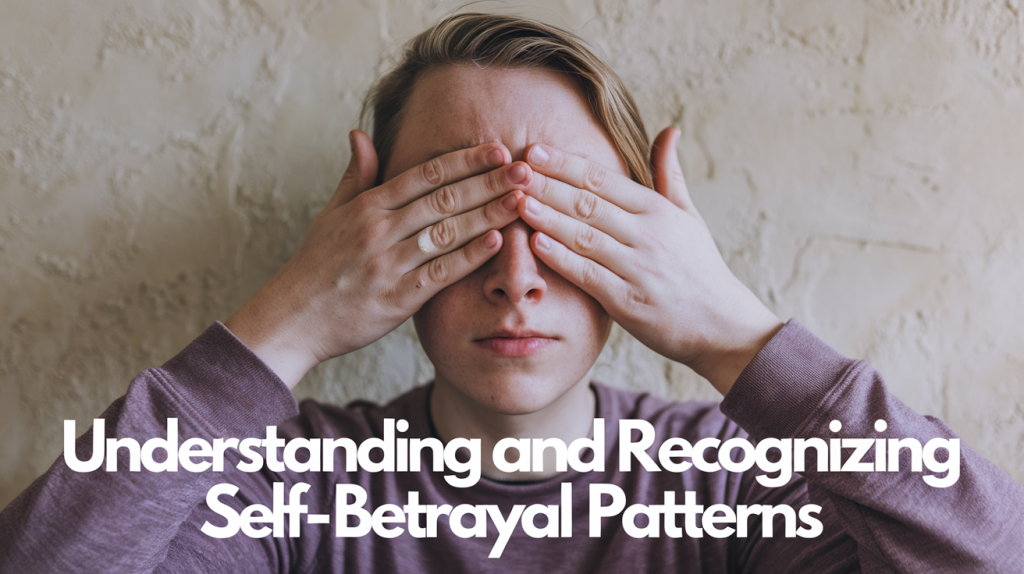Do you often make choices that go against your inner values? When was the last time you said “yes” when you wanted to say “no”?
Every time this happens, it creates tiny cracks in your relationship with yourself.
Many people struggle to spot these patterns of self-betrayal in their daily lives. Small compromises build up over time, affecting your well-being and personal growth without you noticing.
This guide will show you several key ways to recognize when you’re betraying your true self, plus practical steps to build a stronger connection with your inner voice.
Let’s look at how you can start making choices that truly reflect who you are.
What is Self-Betrayal

Self-betrayal occurs when someone acts against their own values, beliefs, or needs to please others or avoid conflict.
It’s like making a promise to yourself and then breaking it repeatedly.
Going along with situations that feel wrong, staying silent when something matters, or ignoring personal boundaries are common examples.
It’s like knowing what feels right but choosing to ignore it.
This pattern often starts small – saying “yes” to extra work while feeling overwhelmed, or pretending to agree with opinions that go against personal beliefs.
Over time, these small acts build up, creating a disconnect between what someone truly wants and what they actually do.
Common Self-Betrayal Patterns
These patterns of self-betrayal can harm our well-being. It’s important to recognize and address them for personal growth and better relationships.
1. Always Saying Yes

You find yourself saying “yes” when you want to say “no.” Maybe it’s helping a friend move when you’re tired or taking on extra work when you’re already busy.
You do this because you don’t want to upset anyone. Soon, your calendar fills up with things you don’t really want to do. You feel tired and upset, but keep saying yes anyway.
This pattern makes you lose sight of your own priorities and needs. The constant “yes” creates a reputation where others expect you to always be available, making it even harder to say no.
2. Keeping Quiet When You Should Speak

You stay silent when something bothers you. In meetings, you don’t share your ideas. When friends make plans you don’t like, you go along with them.
You worry that speaking up might cause problems. Each time you stay quiet, you feel smaller inside. You end up doing things you don’t believe in.
The silence builds walls between you and others, preventing real connections.
Your unique perspectives and ideas stay hidden, robbing both you and others of valuable input.
3. Not Taking Care of Yourself

You push yourself too hard and ignore when your body needs rest.
You skip meals to finish work, stay up late to help others, or forget to take breaks and your body tells you to slow down through headaches or feeling tired, but you ignore these signs.
You put everyone else’s needs before your own health.
This creates a pattern where self-care feels selfish or unnecessary. Your body learns that its signals for help won’t be heard, leading to bigger health issues.
4. Making Yourself Small

When good things happen, you brush them off.
If someone says you did a great job, you say it was nothing special. You worry that talking about your success might make others feel bad.
You find ways to make your achievements seem smaller than they are. This makes it hard to feel good about what you do well.
Others start to believe your self-doubt, potentially missing your true capabilities. The habit of downplaying success prevents you from seeing your own growth and potential.
5. Accepting Less Than You Need

You stick with situations that don’t make you happy. Maybe it’s a friendship where you give more than you get or a job that doesn’t pay enough.
You tell yourself it’s better than nothing. You stay because changing feels scary. Each time you accept less, you expect less.
You start to forget that you deserve better, making it harder to recognize good opportunities when they come.
This creates a pattern where low standards become normal.
6. Pretending Everything’s OK

You hide your real feelings behind a smile. When something hurts, you act like it doesn’t matter.
You don’t want others to see you upset or angry. You say, “I’m fine,” even when you’re not. Keeping feelings bottled up makes you feel alone and misunderstood.
This false front prevents others from offering genuine support when needed.
The gap between your outer appearance and inner reality grows wider each time you pretend.
7. Giving Up Your Dreams

You let go of things that matter to you to make others happy. You might choose a job your parents like instead of following your passion.
You stop doing hobbies you love because someone else thinks they’re silly. Each time you give up something important, you lose a piece of who you are.
These sacrifices build up over time, creating a life that looks good to others but feels empty to you.
The distance between who you are and who you show up as becomes a source of deep regret.
The Impact of Self-Betrayal
When you consistently act against your own needs and values, the effects spread through many areas of your life. Self-betrayal isn’t just a minor issue—it creates ripples that touch everything from your health to your work life.
These impacts often start small but grow over time, affecting how you feel about yourself and how you connect with others.
Let’s look at the main ways self-betrayal can affect your daily life:
- Mental and Emotional Health Impact: Ignoring your inner voice can lead to stress, anxiety, and a feeling of disconnection. It can also cause physical issues like poor sleep, fatigue, and tension.
- Relationship Strain: Without boundaries, relationships suffer, leading to resentment and strained connections. Miscommunication and emotional distance replace genuine interaction.
- Workplace Challenges: Not setting boundaries at work causes tasks to pile up, leading to burnout and lower job satisfaction. Poor communication about workload affects team cultures and personal growth.
- Declining Self-Esteem: Prioritizing others’ needs over your own can lower self-worth, making it harder to assert personal needs. This creates a cycle of low confidence and more self-betrayal.
- Disconnect from Values and Goals: Long-term self-betrayal causes a disconnect from personal values and goals, leading to feelings of emptiness and unhappiness despite outward success.
Self-Betrayal Patterns in Your Own Life
Physical signs often point to self-betrayal. Your body might signal discomfort after you agree to plans you don’t really want. This tension can show up as headaches, stomach issues, or overall tiredness. Watch how your body responds to different choices.
Pay close attention to situations where you feel pushed into actions rather than freely choosing them. These moments often lead to regret after decisions and can leave you feeling drained, especially around certain people or activities.
Tracking your feelings can help spot these patterns. Try keeping simple notes about times when strong emotions come up, but you stay quiet. Notice when you put others’ needs first while yours go unmet.
Many people find they regularly second-guess their own judgment or say “yes” when they truly want to say “no.” This habit creates emotional distance and numbness over time. These reactions aren’t random—they point to areas where you might be betraying your true self.
Building Self-Trust and Respect

Starting to honor personal truth takes small steps. Begin with tiny moments of honesty – saying no to a small request that doesn’t feel right.
Create time each day to check in with personal feelings and needs. Write down what feels true without judging it.
Practice setting one small boundary each week. Listen to that quiet inner voice that knows what’s right.
Start with safer situations where saying no has lower stakes. Tell trusted friends about these efforts to stay accountable.
Remember that changing patterns takes time – celebrate small wins when choosing self-respect over people-pleasing.
Keep a record of moments when following inner wisdom led to good outcomes. This builds confidence in personal judgment and strengthens self-trust gradually.
Conclusion
Breaking free from self-betrayal begins with small, steady steps toward self-trust.
When you honor your inner voice, say no when needed, or set healthy boundaries, you strengthen your relationship with yourself. These changes might feel uncomfortable at first, but they lead to genuine connections and better mental health.
Change doesn’t happen overnight. Start by noticing patterns and taking small steps to align your actions with your values. The goal isn’t perfection but progress—making choices that feel true to who you are.
Recognizing these patterns and making conscious decisions creates a life that reflects your real self.
The path to self-trust opens up with each small decision you make for yourself.
Frequently Asked Questions
What are the Acts of Self-Betrayal?
Letting issues go unaddressed, putting others above yourself, tolerating harm, hiding feelings, and giving up dreams for outside approval.
How can you Tell if You’re Experiencing Self-Betrayal?
Watch for physical signs like stomach knots or headaches, feeling tired around certain people, making excuses for others’ behavior, and saying yes while wanting to say no.
How to Move on From Self-Betrayal?
Start with small “no’s” when things don’t feel right, write down true feelings daily, set one simple boundary each week, and spend time with people who support honest choices.

Elara Monroe
Get Updates
Join our email list for your latest updates.







